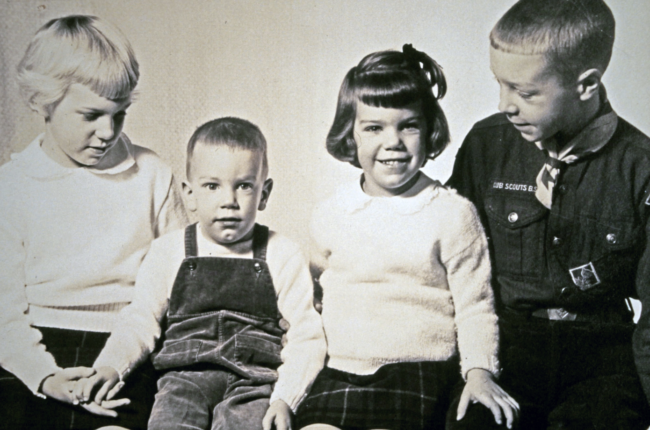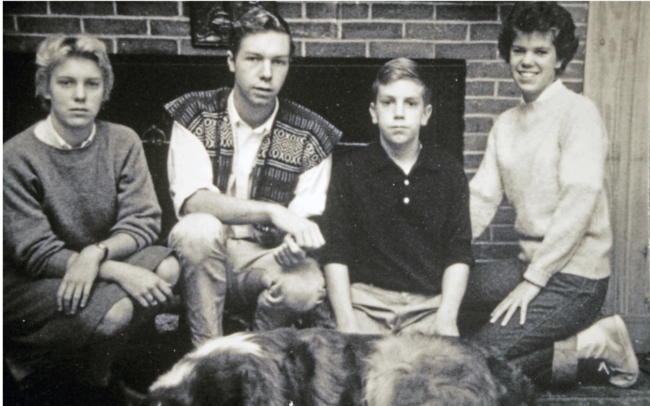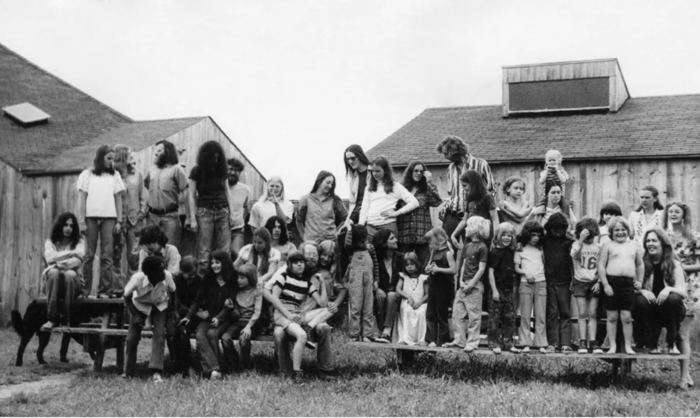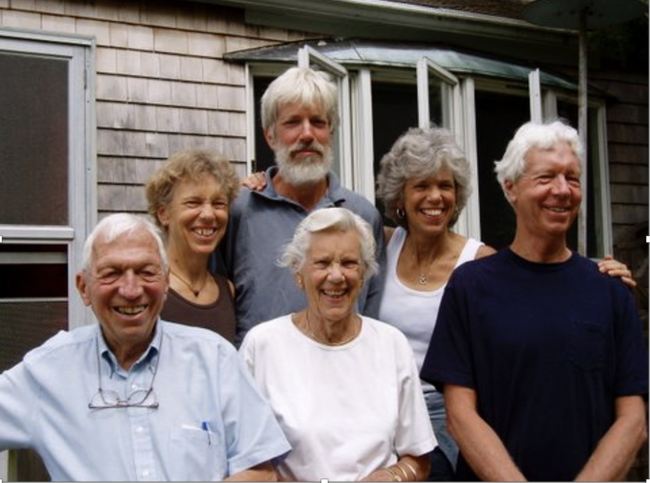GUEST POST by JACOB WATSON
When we enter our family as a newborn the rules are already in place. As we grow up in our families of origin, we observe the spirit of the family.

The author and his siblings, 1952: Lea, Doug, Molly, Jacob
When older, and hopefully wiser, we create our own family, with its own spirit. This is what endures over generations. It is spirit because it is not limited by space – where we live – or time – our age – but rather describes the essence of the family.
When my parents entered their elder years and required help, my two sisters, my brother and I needed to communicate more closely. We knew our family was changing. What was the spirit of our family, i.e., what would not change? To discuss and make decisions about our parent’s physical needs, we began to talk to each other every week by phone.
With my brother living in the same town as our parents, one sister in Vermont, another in California and me in Maine, these calls necessitated a spirit of cooperation. We needed to make coordinated decisions to benefit our parents.

1962 Author’s sibling photo: Lea, Jacob, Doug, Molly
Early on, we four had to teach our parents that having family conversations about difficult topics like sex, health and politics was important. To our surprise, our parents became passable learners.
Three of us had been involved in starting a Summerhill school – which our parents visited – where when someone had a problem, they rang the school bell to call a school meeting. A community conversation ensued, sometimes with a solution. Sometimes not. But the value of open discussion was clear: fewer secrets and a sense that we were in this together: not a bad spirit for a family.

Collins Brook, 1973, the Summerhill-inspired school, the author founded
My siblings and I were relieved to find that our parents flourished with these discussions, even if they were at first only annual, and somewhat formal events. The new family sharing developed into more loving relationships between us. We knew each other better and we respected what we saw and heard.

Author’s family photo, 2007: Dad, Lea, Doug, Mum, Molly, Jacob
After our parents died the four of us decided to continue our weekly phone conversations. We shared our present lives and memories of past family events. Each of us was surprised at how we would often remember the same family event in a different way. Sometimes we laughed and sometimes we cried at our different versions of the same event.
We discovered a sweet benefit to this sharing, namely that we each could be heard, and our version honored. We were able to avoid arguing about whose version was correct. In retrospect, I thank our parents for instilling this non-combative and mutually affirming spirit.
Over time our weekly phone connections transformed into Zoom calls. The visuals helped a lot, especially as our own aging limited the times we got together in person.

I came to better appreciate my two sisters and my brother as people making their own ways in the world, doing the best that they could. As we shared the details of our lives each week, details became less important than the person who shined through. It was as if I could see the essence, the spirit, of each of my siblings. And with these revelations came a deepening respect and appreciation for the true person underneath the daily details.
As our family elders grow old, we are tasked with creating the kind of family that we want as we ourselves age. I know it feels risky to reach out and say what we would like to experience in our ideal family, but it is the only way to create it. As a member of a family, we have a legitimate stake in how the family functions going forward. We are the creator of our family’s spirit.
 Jacob Watson is an interfaith minister, author and spiritual teacher. He is the founding Abbot of the Interfaith Chaplaincy Institute of Maine, and has written three spiritual books, including Essence: The Emotional Path to Spirit. His recorded meditations and children’s stories are available on Insight Timer. Jacob provides Spiritual Companionship, individual meetings – in his home office sanctuary or via Zoom. Email: jacobw@gwi.net
Jacob Watson is an interfaith minister, author and spiritual teacher. He is the founding Abbot of the Interfaith Chaplaincy Institute of Maine, and has written three spiritual books, including Essence: The Emotional Path to Spirit. His recorded meditations and children’s stories are available on Insight Timer. Jacob provides Spiritual Companionship, individual meetings – in his home office sanctuary or via Zoom. Email: jacobw@gwi.net
 Jacob Watson is an interfaith minister, author and spiritual teacher. He is the founding Abbot of the Interfaith Chaplaincy Institute of Maine, and has written three spiritual books, including Essence: The Emotional Path to Spirit. His recorded meditations and children’s stories are available on Insight Timer. Jacob provides Spiritual Companionship, individual meetings – in his home office sanctuary or via Zoom. Email: jacobw@gwi.net
Jacob Watson is an interfaith minister, author and spiritual teacher. He is the founding Abbot of the Interfaith Chaplaincy Institute of Maine, and has written three spiritual books, including Essence: The Emotional Path to Spirit. His recorded meditations and children’s stories are available on Insight Timer. Jacob provides Spiritual Companionship, individual meetings – in his home office sanctuary or via Zoom. Email: jacobw@gwi.net



